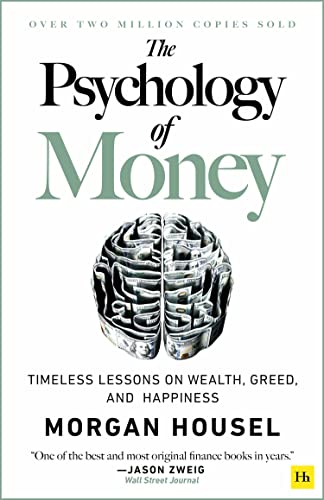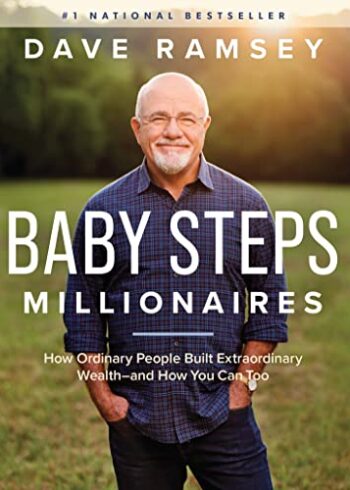The Psychology of Money: Timeless lessons on wealth, greed, and happiness
ISBN-10: 0857197681
ISBN-13 : 978-0857197689
Publisher : Harriman House (September 8, 2020)
Language : English
Paperback: 256 pages
Reading Age : 16 years and up
Dimensions : 5.5 x 0.65 x 8.5 inches
Item Weight : 9 ounces
$14.99 $13.49
Description
Doing well with money isn’t necessarily about what you know. It’s about how you behave. And behavior is hard to teach, even to really smart people. Money―investing, personal finance, and business decisions―is typically taught as a math-based field, where data and formulas tell us exactly what to do. But in the real world people don’t make financial decisions on a spreadsheet. They make them at the dinner table, or in a meeting room, where personal history, your own unique view of the world, ego, pride, marketing, and odd incentives are scrambled together. In The Psychology of Money , award-winning author Morgan Housel shares 19 short stories exploring the strange ways people think about money and teaches you how to make better sense of one of life’s most important topics.
Additional information
| Format | Paperback |
|---|






























Stephen S –
From the first sentence to the last, this book provides the latest and most up-to-date evidence for financial literacy’s wholesome power to enrich your entire life. The author tells stories to discover financial literacy and living a good life go hand and hand. Most financial books discuss the dominated and respected quantitative side, the sophisticated science, complicated formulas, and mind-numbing statistics. Reading the traditional personal finance genres makes people erroneously think investors need to be intelligent and aggressive to invest successfully., The Psychology of Money is courageously different. It is about life first and finances second. Don’t we want to better understand our behavior, our sense of ourselves and what makes us tick so we can achieve that vibrant and contented life? I know I do., The author skillfully separates the easy part of discovering the investing process versus the hard part. This may shock newbies, but understanding the quantitative aspect of finances, such as constructing a diversified portfolio of low-cost index funds, is the easy part. Look, it is not the little guy or gal versus the massively intimating stock market with the macho goal of beating the average returns. Instead, this book is about understanding our behavior and the decisions we make to achieve a balanced and calm life with accepting reasonable stock market returns. Now that’s the hard part! But this author makes understanding our behavior achievable and interesting. He accepts whatever skills, experience, or knowledge readers bring to the table., The author brings up an age-old adage that we have been taught by our elders for generations—don’t take things so personally! With life’s many challenges and sometimes negative surprises, isn’t it about how we react that counts? Instead, if we respond with wisdom gained from our experiences over the long haul, the challenge itself will eventually be insignificant., The author explains that our reactive behavior, whether the sudden death of a loved one, a broken water pipe damaging our house, or a stock market crash, how we respond to each of these vastly different crises is no different. As a reviewer of this outstanding book, I took the liberty of interpreting the primary theme with my examples. With the death of a loved one, we can blame the doctors, the hospital, and isolate from friends and family, and sob over beers for the rest of your life as a lonely and bitter widow or widower, or you can blame the stock market, your broker, or valueless Wall Street for your portfolio loses. For example, it is well known that millions of investors reacted negatively for over a decade. They sat out with their two to three trillion of the longest bull market in history because they lost money in the 2008 financial crisis. So, no matter what the experience, isn’t it always how we react? This book would help those unfortunate investors pull themselves and their portfolio together to get back in the market., To bring mindfulness to our reactions, the author talked about investors’ emotions, attitude, and temperament. To be successful in this counterintuitive financial system is to be aware and insightful of this powerful psychological human potential—your expectation of future returns. The Goldilocks Principle doesn’t have too high return expectations or too low, but somewhere in between. But what is a reasonable expected return?, The author reports one of the most significant FACTS of the entire book: The United States Stock Market Returns 6.8% after Inflation. Allow me to repeat, 6.8%., According to the author, our United States capitalistic system produces about 6.8% return minus inflation since the 1870s (3.1% average inflation generates a total return of 9.9%). It is the law of averages, and it is powerful if we know how to tap into it and to be 100% satisfied with average returns (It has been researched many times that too many investors fail to get average returns). Morgan explains how to harness this massive industry and what strategy will get you the average return. The goal is to earn the average return over many years. Why? Two reasons:, 1. 6.8% return over inflation is a great return!, 2. Because our emotions will be spared the negative reactions from the massive swings (volatility) of the stock market which will set you up to panic and “get out.”, This book will help you find that “just right” balance of your investments and your mind so you can sleep soundly with confidence and reach your financial goals over long periods of time. There is no get rich quick scheme. If a financial adviser or your best friend says that they can beat the averages, walk away, and never listen to that nonsense., Housel encourages all investors by debunking one debilitating myth from the start. All you need to be a successful investor is patience, think long term, and one tiny piece of mathematics, the power of compound interest over decades. You do not need an MBA or a high IQ! In fact, for the newbie financial reader with no financial background or smarts, take heart, you have an advantage. He wrote: “Ordinary folks with no formal financial education can be wealthy if they have a handful of behavioral skills that have nothing to do with formal measures of intelligence.”, That’s me! I have never taken a financial course in my life. I flunked 2nd grade and I scored a lower than 100 IQ. But I had a huge advantage because I majored in psychology. Knowing how my mind functioned, I mitigated my return expectations of the market and drama during three of the biggest stock market crashes in history. My expectations for growth and losses are reasonable, balanced between stocks and fixed because I knew what the world-wide stock market returns since 1870. With my mind disciplined to stay the course forever and to do what I can do—control the real deal by keeping expenses low and be extremely happy with reasonable returns. I have perfect control by paying myself instead of some Wall Street mucky muck’s yacht., For years, seasoned investors poo-poo psychology (read the one and two-star reviews of this book). There is at least one huge exception. One of the most significant financial thinkers of the 20th century and the mentor and professor of Warren Buffett. Ben Graham wrote said in the very first paragraph of his monumental 623 page The Intelligent Investor, “…little will be said here about the technique of analyzing securities; attention will be paid chiefly to investment principles and investors’ attitudes.” (1973 revised, page 1)., The author had the great wisdom to cite a book titled “Enough” by the legendary John Bogle. Morgan tells stories of people “hit it big” (IN THE BILLIONS!). It wasn’t “enough.” They want more, and in the end, they lost it all. Bogle’s most famous quote to get the market averages mentioned previously is to invest in the “entire haystack, do not look for the needle.”, The author makes an important statement that is long overdue and worth repeating—the qualitative discussions of investing is more complicated than the quantitative discussions. It is humans that make the decisions and do all the trading on the stock exchanges throughout the world. Last I heard, humans have feelings. Housel says that science is exact and is governed by predictable physical laws. Molecules and atoms do not have feelings! But millions of investors do! Sir Isaac Newton would agree. He famously lamented after losing his investments to the South Sea Disaster in the 18th century, “I can calculate the motion of heavenly bodies, but not the madness of people.” Knowledge of psychology and behavior will help you understand and protect yourself from the “madness of people.”, The author covers a lot of ground because there is a lot of human behavioral and psychological constructs to explain. Luck vs. skill, attitude vs. math, being average vs. being superior, uncertainty vs. certainty, and confidence born from wisdom vs. overconfidence born from recklessness are impossible to measure and explain. The author correctly labeled these constructs “soft skills” (Hard skills are the math, statistics, graphs, and tables). Luck, attitude, accepting average returns, uncertainty, long-term horizon, and overconfidence are difficult to explain without emotional pushback from some investors. Most seasoned investors want to be intelligent, act aggressive, appear confident, and look sophisticated and soft skills will not get them that image and beat the market., We love to think successes originated on skills, knowledge, intelligence, spreadsheets, and math. The most vital reaction to many seasoned investors is downplaying luck to investment success. But Morgan won’t have it. Making money from stock and bond investing is being smart with the complicated reality we face, and spreadsheet knowledge will not be enough. That being lucky is part of the equation. He admits that the luck factor is the question that might not be answered in our lifetimes., In the meantime, there is nothing wrong with being lucky. The returns are green too. But most seasoned investors feel insulted. Warren Buffett always reports that he is an incredibly fortunate investor born in the United States. I am lucky that I am alive after contracting stage two colon cancer twenty years ago. Any one of us could have been born in a small village in India in abject poverty, a shantytown in Lima, Peru, or one of our country’s public housing projects., Unfortunately, I gave the book four stars. There was one paragraph that does not belong in the book. I was disappointed. I agree that I might be petty, but that paragraph doesn’t make any sense because it doesn’t follow the narrative throughout. On page 218, I rewrote here for those who use the indexing strategy, especially Bogleheads:, “That doesn’t mean index investing will always work. It doesn’t mean it is for everyone. And it doesn’t mean active stock picking is doomed to fail. In general, this industry has become too entrenched on one side or the other—particularly those vehemently against active investing.”, Did the Author Lose His “Psychology” for a Moment?, I scratched my head and seriously wondered, has the author lost his mind? What in the world motivated the author had to write this when he shares how he invests, and it’s just like most Bogleheads and myself invest with low-cost index funds? I believe I can speak for most Bogleheads: of course, we are “vehemently against active investing!” It’s expensive and flawed is thoroughly agreed upon by genuine fiduciary financial advisers. Furthermore, there are books, peer-reviewed academic articles, and the Bogleheads’ forum experiences of how successful the indexing strategy has been overactive management. The author admits on the following page that 85% of active managers fail to beat the averages! The active management strategy has been proven dead for decades, and the author’s stories debunk active management. Over 35 million investors have their seven trillion dollars with Vanguard and TIAA. We know that active managers from Wall Street’s big banks and brokerage firms spend a lot of time sipping martinis on their yachts., Other than that hideous paragraph, The Psychology of Money is a fine book because it makes a huge contribution to financial discussions and what it means to be financially literate. The qualitative argument of financial literacy is desperately needed in the financial world. The quantitative argument is appropriate for constructing your portfolio and understanding how markets only return 6.8% average for 150 years. I learned a ton by reading those books too. But after that, no amount of math, sophistication, financial engineering, or science will protect investors from a bear market. Only what is between our ears will. Investors must get our heads behind the idea that we are up against a massive industry that wants to use our money to make money for themselves., The industry is playing a totally different game, different motivation, and most important different life values—they spend 24/7 in front of their powerful computers trading for two goals only, bonuses and beating the averages. I have one more example of luck–We are lucky that Morgan Housel wrote this important work. It is not about looking at your finances 24/7, searching for that investment “gem” that will make you rich quickly or to compete. At the end of the day, it is about doing our part in making the world a better place than it is now, being generous to those in need, be part of something bigger than yourself, and spending quality time with family and friends.
Larry Frank –
Psycholology of Money: Timeless Lessons on Wealth, Greed and Happiness by Morgan Housel is a timeless work about how our feelings, emotions and interactions with money often results in different outcomes for different people – because people are different. So, insights into how to think and behave about money is instructive., You may think you don’t have enough money to make a difference for your future. I think this book will show you, how even with those thoughts, that you can., Others may believe they have more than enough. Those too are risky thoughts and beliefs., Because people are different, everyone should read this book to see what you uniquely learn about yourself and how you should think about money., Chocked full of great insights to guide us all., Quotes that hit home from various chapters are presented below. There are many more quotes possible, but then you’d miss the message between each quote. I strongly suggest getting the book to see how these below snippets string together into a powerful story about how we think and behave towards money matters., Quote:, • Your personal experiences with money make up maybe 0.00000001% of what’s happened in the world, but maybe 80% of how you think the world works., • Luck and risk are siblings., • Yes, but I have something he will never have … enough., • There is no reason to risk what you have and need for what you don’t have and don’t need., • The hardest financial skill is getting the goalpost to stop moving., • $81.5 billion of Warren Buffett’s $84.5 billion net worth came after his 65th birthday., • Buffett began serious investing when he was 10 years old., • His skill is investing, but his secret is time. That’s how compounding works., • But good investing isn’t necessarily about earning the highest returns, because the highest returns tend to be one-off hits that can’t be repeated. It’s about earning pretty good returns that you can stick with and which can be repeated for the longest period of time. That’s when compounding runs wild., • Getting wealthy vs. staying wealthy., • Getting money is one thing. Keeping it is another., • Planning is important, but the most important part of every plan is to plan on the plan not going according to plan., • No one is impressed with your possessions as much as you are., • When you see someone driving a nice car, you rarely think, “Wow, the guy driving that car is cool.” Instead, you think, “Wow, if I had that car people would think I’m cool.”, • Humility, kindness, and empathy will bring you more respect than horsepower ever will., • Spending money to show people how much money you have is the fastest way to have less money., • Money has many ironies. Here’s an important one: Wealth is what you don’t see., • Past a certain level of income people fall into three groups: Those who save, those who don’t think they can save, and those who don’t think they need to save., • Building wealth has little to do with your income or investment returns, and lots to do with your savings rate., • The value of wealth is relative to what you need., • Past a certain level of income, what you need is just what sits below your ego., • People’s ability to save is more in their control than they might think., • Things that have never happened before happen all the time., • The thing that makes tail events easy to underappreciate is how easy it is to underestimate how things compound. How, for example, 9/11 prompted the Federal Reserve to cut interest rates, which helped drive the housing bubble, which led to the financial crisis, which led to a poor jobs market, which led to tens of millions to seek a college education, which led to [over a trillion dollars] in student loans with [a high percentage of default rates]., • The correct lesson to learn from surprises is that the world is surprising., • The most important part of every plan is planning on your plan not going according to plan., • The purpose of the margin of safety is to render the forecast unnecessary., • The End of History Illusion is what psychologists call the tendency for people to be keenly aware of how much they’ve changed in the past, but to underestimate how much their personalities, desires and goals are likely to change in the future. [Thus, their history of change won’t change anymore into their future]., • Every job looks easy when you’re not the one doing it., • Successful investing looks easy when you’re not the one doing it. Hold stocks for the long run … but do you know how hard it is to maintain a long-term outlook when stocks are collapsing?, • Price … not dollars and cents … it’s volatility, fear, doubt, uncertainty … all of which are easy to overlook until you’re dealing with them in real time., • Beware of taking financial cues from people playing a different game than you are., • When investors have different goals and time horizons – and they do in every asset class – prices that look ridiculous to one person can make sense to another, because the factors those investors pay attention to are different., • The interesting thing about [absolutely pessimistic] stories is that their polar opposite – forecasts of outrageous optimism – are rarely taken as seriously as prophets of doom., • Pessimism just sounds smarter and more plausible than optimism., • …progress happens too slowly to notice, but setbacks happen too quickly to ignore., • The more you want something to be true, the more likely you are to believe a story that overestimates the odds of it being true., • We don’t know what we don’t know., • Coming to terms with how much you don’t know means coming to terms with how much of what happens in the world is out of your control. And that can be hard to accept., • Less ego, more wealth., • If you want to to do better as an investor, the single most powerful thing you can do is increase your time horizon., Unquote., There’s a lot of wisdom alone in the various quotes above. There’s even more wisdom reading how they string together to see the larger story line to understand your psychology of money applied in your own life., Each person reading Housel’s work will get something different out of it than someone else. And each time you read it (I suggest more than once) you too will get yet still something else out of it.